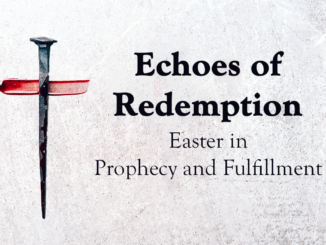
Read Zechariah 9:9 and Psalm 118:26
An interesting study during Easter is the profound fulfillment of many Old Testament prophecies. The triumphal entry of Jesus into Jerusalem is an example of a moment foretold centuries prior by the prophet Zechariah and in the Psalms.
In Zechariah 9:9, we find a prophecy that speaks of a coming king, humble and riding on a donkey, echoing themes of peace and salvation. The imagery painted is that of a ruler unlike any other—a King who will bring deliverance not through military might but through humility and compassion. This prophecy points to a significant moment in history, a moment that would shape the destiny of humanity.
Similarly, Psalm 118:26 declares, “Blessed is he who comes in the name of the Lord.” This verse anticipates the arrival of a chosen One, heralded by the people with shouts of acclamation and praise. It captures the anticipation and excitement surrounding the coming of this promised deliverer.
The fulfillment of these prophecies unfolds during the final days of Jesus’ earthly ministry. As Jesus approaches Jerusalem, He instructs His disciples to fetch a donkey, fulfilling Zechariah’s prophecy. In doing so, Jesus emphasizes the humility and peace that characterize His kingdom. He does not arrive on a majestic steed, as earthly kings would, but on a humble donkey, symbolizing His role as the Prince of Peace.
He does not arrive on a majestic steed, as earthly kings would, but on a humble donkey, symbolizing His role as the Prince of Peace.
The scene that follows is one of jubilation and recognition. The crowds welcome Jesus with shouts of “Hosanna! Blessed is he who comes in the name of the Lord!” fulfilling the words of the Psalmist. The people recognize Jesus as the promised Messiah, the fulfillment of God’s covenant with His people.
The fulfillment of these prophecies carries profound implications for us today. It reminds us that God is faithful to His promises and that His plans unfold according to His perfect timing. Just as the people eagerly anticipated the arrival of the Messiah, we, too, are called to await the second coming of Christ with anticipation and readiness.
Also, the manner in which Jesus fulfills these prophecies challenges our understanding of power and kingship. Jesus, the King of Kings, chooses humility over grandeur, service over dominance. His kingdom operates on principles of love, compassion, and sacrificial service—a stark contrast to the kingdoms of this world.
As we reflect on the fulfillment of these prophecies during Easter, may we be reminded of the profound love of God demonstrated through the life, death, and resurrection of Jesus Christ. Let us embrace the humility and love exemplified by our Savior and recommit ourselves to living lives that reflect His kingdom values.
As we prepare our hearts for Easter, let us remember the words of Zechariah 9:9 and Psalm 118:26 and rejoice in the coming of our King. May we, like the crowds who welcomed Jesus into Jerusalem, recognize Him as our King and Savior and praise His holy name.
Reflective Questions:
- How does the imagery of Jesus riding on a donkey fulfill the prophecy of Zechariah 9:9? What does this reveal about Jesus’s character as our King? How well does your life reflect a similar character?
- Reflect on the people’s response as Jesus entered Jerusalem. How does their recognition of Him as the Messiah challenge us to acknowledge His kingship in our lives? In what parts of your life do you struggle to surrender to His kingship?
- Consider the significance of Jesus being hailed as the one who comes in the name of the Lord. How does this title affirm His divine identity and mission? How do you worship Him on a daily basis?

